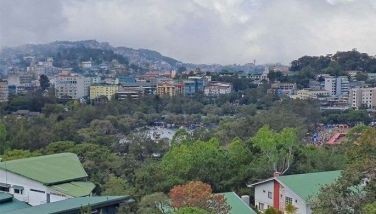Nokor becoming a major source of illegal drugs DDB
MANILA, Philippines – The communist North Korea is becoming a major source of illegal drugs of transnational syndicates that use the Philippines as transshipment point in their operations, the Dangerous Drugs Board bared yesterday.
DDB Chair Vicente “Tito” Sotto III revealed this after anti-narcotics authorities found that the millions of pesos worth of dangerous drugs seized in Subic Bay earlier this year might have come from North Korea.
“We have an emerging enemy in our war against illegal drugs – North Korea. We have a strong suspicion that the illegal drugs in Subic came from North Korea,” he said in an interview.
Sotto said they also received intelligence information from their counterparts in other countries in the region that drug syndicates from the communist nation have expanded operations to the Asia-Pacific region.
Authorities have often pointed to China as source of smuggled chemicals used in manufacturing illegal drugs that have been seized in earlier operations.
The P4 billion worth of smuggled shabu seized by government agents at the Subic Bay Freeport in May was destroyed last July 11.
The Philippine Drug Enforcement Agency (PDEA) destroyed by burning over 700 kilograms of smuggled shabu (methamphetamine hydrochloride) at the agency’s incineration plant in Cavite as its investigators remained clueless as to who or which syndicate was behind the smuggling of the illegal drugs at the Freeport.
The DDB chair admitted that the Philippines has been used as “transshipment point of international drug syndicates” due to its vast coastline that he admitted is “very hard to guard.”
“This is why we have been working for closer and stronger regional and international cooperation against illegal drugs. We need the help of other countries, especially our neighbors, in preventing the entry and exit of dangerous drugs in our country,” he explained.
Sotto said transnational syndicates use the country specifically for shipping illegal drugs to Australia, the United States and Southeast Asia.
It can be recalled that during the 7th annual meeting of the Association of Southeast Asian Nations (ASEAN) – China Cooperative Operations in Response to Dangerous Drugs held in the country early last month, Sotto pushed for closer cooperation between the ASEAN and China in the campaign against drug problems in the region.
He told his counterparts in other countries in the region that there is a need to strengthen their strategies in combating transnational drug syndicates whose operations he said are becoming bolder.
“Information sharing is a strategy as important as strategies in reduction of demand and supply in this war on drugs. Illegal drug syndicates operate without borders not national boundaries, so our responses against them should also be borderless and transnational,” he said.
“We must realize that we must make common cause against the drug menace if we are to succeed. We must all work within a fundamental commonality of framework and structure to end the traffic in illegal drugs. We all need to craft a common legal and operational infrastructure consistent with the core values of our countries and people,” Sotto added.
With this, he said there is a need for the international cooperation against illegal drugs in the region to come up with a “common law and enforcement response in the battle against illegal drugs that is appropriate and responsive yet maintaining the differences of our approaches since situations in each of our countries are unique in reality.”
However, Sotto admitted that the Philippines needs more help and support from its partners in the war against drugs especially “to prevent its vast coastline from being drop-off points for illegal drugs.”
But he clarified that law enforcement has so far been effective in preventing the spread of illegal drugs in the country, countering the failure to prevent entry of drug syndicates here. “Our successes in Subic, La Union and Quezon recently show that illegal drugs enter our jurisdiction through our unguarded shores,” he said.
The convention held at the Hotel Intercontinental Manila was attended by heads of various narcotics agencies from Brunei Darussalam, Cambodia, Indonesia, Malaysia, Myanmar, Philippines, Singapore, Thailand and Vietnam, and China.
The secretariat of ASEAN led by Keo Chea also joined the meeting.
Each delegate presented their respective programs toward curbing the supply of illegal drugs and introducing alternative livelihood to deter farming of illicit crops.
The ASEAN-China Cooperative Operations in Response to Dangerous Drugs (ACCORD) meetings are held annually in the areas of civic awareness, demand reduction, law enforcement and alternative development, which represent the pillars of action endorsed by 36 countries and 16 international organizations in pursuit of freeing the region from drugs.
For 2008, the Philippines had been chosen to chair the task force meetings on Law Enforcement and Alternative Development with the DDB serving as the focal partner of ACCORD.
Last week, meeting on Civic Awareness and Demand Reduction was held in Vietnam.
The meetings were aimed at identifying indicators, gaps, future priorities and progresses achieved in the attainment of a drug-free ASEAN and China by 2015.
On the law enforcement side, discussions revolved around new trends, outstanding issues, precursor control, dismantling of clandestine laboratories, and disposal of dangerous drugs and controlled chemicals.
Alternative development, on the other hand, was anchored on eliminating or significantly reducing the production of illicit crops by introducing licit means of livelihood and boosting rural progress.
Cambodia, China, Indonesia, Myanmar, Philippines and Thailand will render updates on their opium and cannabis eradication efforts, with the UNODC leading a session on the marketing of alternative development products.
- Latest
- Trending































